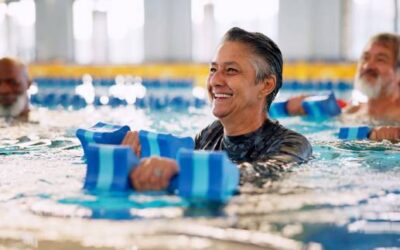BLOG
Most Popular Posts
Addressing Chronic Pain in Seniors Through Physical Therapy
Chronic pain is one of the most common health challenges faced by seniors, affecting nearly half of the older adult population. This persistent discomfort—often resulting from conditions like arthritis, neuropathy, osteoporosis, or past injuries—can significantly impact mobility, mood, and overall quality of life. Unlike acute pain that signals injury or illness, chronic pain lingers for months or even years and can be particularly debilitating without proper intervention.
Exercises to Improve Posture & Reduce Back Pain in Seniors
As we age, our bodies begin to reflect the years of wear and tear—especially in our back, shoulders, and hips. For many seniors, chronic back pain and poor posture are daily hurdles that can affect independence, mood, and overall quality of life. The good news? With the right exercises, it’s possible not just to alleviate discomfort but to rebuild strength, stability, and confidence in every step.
Senior Fitness: Tailoring Exercise Programs to Individual Needs
As individuals age, maintaining physical activity becomes not just a matter of wellness but a cornerstone of independence, mental clarity, and quality of life. Yet the same workout that benefits a 30-year-old may not be suitable—or safe—for someone in their 70s. This is where the importance of tailoring exercise programs to individual needs in senior fitness truly comes into play.
How Speech Therapy Strengthens Swallowing and Reduces Choking Risks
When most people think of speech therapy, they imagine help with pronunciation, stuttering, or language development. Yet, one of the lesser-known but vital roles of speech-language pathologists (SLPs) lies in supporting safe swallowing. The same muscles that allow us to form words and control breath also play a central role in guiding food and liquids safely down the throat. Weakness, poor coordination, or neurological changes can interrupt this process, increasing the risk of choking or aspiration.
Therapy Strategies for Seniors with Post-Surgical Pain
Recovering from surgery can be particularly challenging for older adults, who often face a slower healing process, reduced mobility, and a higher risk of complications. For seniors, effective pain management is essential—not only to enhance comfort but also to prevent prolonged immobility, depression, or hospital readmission. Thankfully, a blend of modern and holistic therapy strategies can support post-surgical recovery in a safe and structured way. Here’s a look at how therapy can make a significant difference for seniors navigating post-surgical pain.
Navigating Arthritis: How Physical Therapy Can Help Seniors
Arthritis is one of the most common chronic conditions affecting seniors, and its impact on daily living can be both physically and emotionally taxing. Characterized by joint pain, stiffness, and decreased mobility, arthritis doesn’t just limit physical activity—it can also diminish independence, contributing to a reduced quality of life. While there is no cure for arthritis, managing its symptoms effectively is possible. One of the most proven and sustainable solutions lies in physical therapy. This intervention offers seniors a pathway to better mobility, pain relief, and a renewed sense of autonomy.
The Cognitive Benefits of Exercise for Older Adults
As people age, it’s common to focus on maintaining physical strength, mobility, and overall health. Yet, one equally crucial aspect often overlooked is cognitive health. Exercise, traditionally associated with physical fitness, has emerged as a potent tool for boosting brain function, particularly in older adults. Research increasingly shows that regular physical activity can significantly enhance memory, sharpen focus, and even delay the onset of cognitive decline.
The Role of Occupational Therapy in Enhancing Senior Life
As we age, everyday tasks that once seemed effortless can become increasingly difficult. From preparing meals and dressing to managing medications and navigating social activities, the effects of aging often interfere with independence. This is where occupational therapy (OT) plays a transformative role. Far from being limited to workplace rehabilitation, OT is a client-centered health profession that supports individuals of all ages in doing the things they need and want to do. For seniors, this means improving quality of life by preserving autonomy, ensuring safety, and promoting engagement in meaningful activities.
How Occupational Therapy (OT) Enhances Quality of Life for Seniors
Aging often brings unique challenges that can affect independence, mobility, and emotional well-being. For many seniors, occupational therapy (OT) becomes an essential part of maintaining dignity and quality of life. This specialized field of therapy is designed not only to restore physical function but also to empower older adults to remain engaged in their daily activities, hobbies, and communities.
How Speech Therapy Can Help with Voice Disorders in Older Adults
As individuals age, changes in voice quality are not uncommon. For many older adults, these changes go beyond the normal effects of aging and become disruptive to daily life. Voice disorders—such as hoarseness, breathiness, tremors, or loss of vocal strength—can severely impact communication, self-expression, and emotional well-being. These issues are often caused by age-related vocal fold atrophy (presbyphonia), neurological conditions like Parkinson’s or stroke, or prolonged misuse or overuse of the voice.









